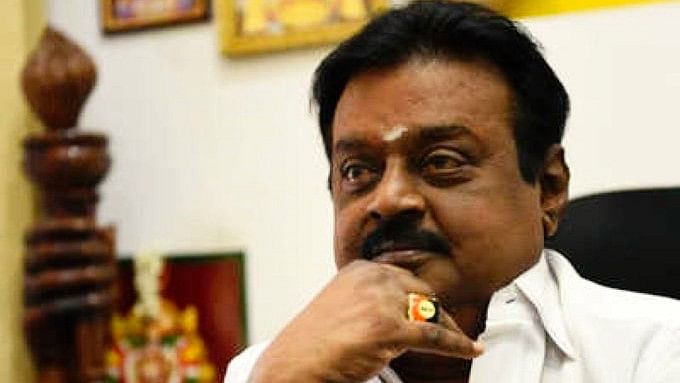
Vijayakanth.
Credits: X/@madan3
As I entered his five star suite in Delhi, Captain Vijayakanth was waiting for us. This was mid-2000.
Vijayakanth's assistant ushered us to his suite. When Vijayakanth saw a lady interviewer (my first name suggests I am male), he became a little self-conscious. He sprung to his feet, bowed and folded his hands in a 'namaskara'.
He sported a bright gold ring and a gold chain. Dressed in a white shirt and a mundu with a gold border, Vijayakanth looked all prepared for a photo shoot. He looked tough but his eyes were benign.
His aide didn’t speak English fluently. We managed with broken English. However, as the interview progressed, things became easier. The photographer I had taken along, a Malayali based in Delhi, knew some Tamil, and he turned out to be a saviour.
"Madam,” Vijayakanth began explaining his role in a film due for release that year. "I am lucky to have played so many police inspector's roles. I now know both sides--society and law. I know what a policeman goes through when he has to control the goons and be tough and at the same time considerate towards poor thieves… If a policeman is good, he gets so much love, if he is bad, how people curse him! I learnt all this while researching the behaviour, work and body language of the police.”
Vijayakanth spoke as though he was baring his heart. He wanted to share so much with an audience that didn't know him. “Aren’t you tired of playing a cop all the time?” I said.
Those were the days of Hritik Roshan's ‘Kaho Naa... Pyaar Hai’. It had broken box office records and girls were swooning over him. I asked him why he wasn’t doing romantic roles.
"Madam, I do sing songs in films but those are largely either patriotic ones or about the love of a brother for his sister, of a son for his mother. And I have realised how much power these songs have,” he said, saying ‘power’ with a special emphasis.
His saviour roles had earned him the sobriquet of Captain, first used for him in the 1991 film Captain Prabhakaran. The translator helped me ask him how the roles had changed him personally.
Vijayakanth paused and replied. His words remain etched in my memory: "Madam, Everyone in my city calls me Captain. I am not sure how many of them even know my name. Madam, I get so many hand-written letters. Most of them are written by women and they call me 'brother Captain' or 'son Captain'. They take me as their real brother and son and pour out their pain in those letters. Some of the letters are also sent with rakhis and blessings. The mothers and sisters tell me that I am their hope! They say I can change society if, inspired by my character, some policemen become good policemen and save the poor from the atrocities of the rich. Some send me sweets as prasada with their blessings. Madam, I tell you every letter is full of love, affection and admiration for me that I cry reading them... " And his eyes had tears waiting to roll down.
Vijayakanth didn't stop them and continued, “Madam, I don't get love letters written in blood from girls calling me their dream man or lover. Not even a single one in my daily mails. This is the respect that I have earned. Women think I can protect them and take care of them, in the absence of their sons or brothers. Madam, (and he put his hand on his heart) I feel so so proud, so proud and so blessed that I would never have felt that way if I had received love letters with arrows piercing a pink heart! This is my real wealth, madam. They are not my fans, they are godly connections who pray for me..."
He said the expectations of the people had pushed him to try his luck as a politician. About five years later, in 2005, he founded Desiya Murpokku Dravida Kazhagam. In 2011, his party won 29 of the 42 seats it contested.
“I know as a political leader I will be able to see that these mothers and sisters are not troubled by goons or the police. It feels like this is now my responsibility," he told me, as the interview progressed.
His voice choked and his eyes welled up again. This time, he took out a white handkerchief and wiped his tears and nose. He was not acting for sure. We sat still. No one spoke.
Adieu Captain. A life lived well!
(The author is a senior journalist based in Kolkata)